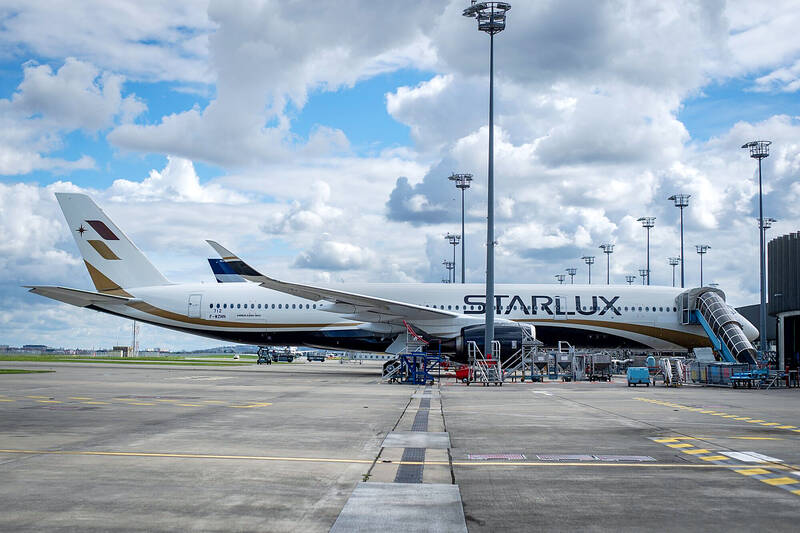Starlux Airlines Co (星宇航空) is nearing an order for almost a dozen Airbus SE wide-body jets in an about US$4 billion deal as it seeks to cement its push into long-haul services, people familiar with the matter said.
The carrier is leaning toward a top-up order for Airbus’ A350-1000, said the people, who asked not to be identified because the information is private.
Starlux could make an announcement during this week’s Paris Air Show. The airline did not immediately respond to a request for comment.

Photo: Bloomberg
Starlux chief executive officer Glenn Chai (翟健華) said in an interview earlier this month that Starlux is always evaluating its plane needs, and has spoken to Airbus and Boeing Co about its requirements.
Starlux has an all-Airbus fleet of 28 planes, flying to destinations including Los Angeles, Tokyo, Singapore and Bangkok.
It already has eight A350-1000s on order, and an increased purchase would help plot its long-haul expansion as it eyes adding flights to Europe and the US east coast.
Taiwanese rivals China Airlines Ltd (中華航空) and EVA Airways Corp (長榮航空) have also ordered Airbus’ largest twin-aisle wide-body plane in the past few months.
Starlux, launched during the COVID-19 pandemic, operates 28 Airbus jets, with another 30 on order. The carrier last year doubled an order of A350 freighters to 10, becoming the largest customer for the planemaker’s new cargo variant of its most-advanced wide-body passenger aircraft.
The airline had planned to expand capacity by as much as 50 percent this year, but that is more likely to be closer to 20 to 30 percent, Chai said in an interview.
It has taken delivery of two A350-900s this year and is due to receive three more planes — an A350-1000 and two A330neos. That is four fewer than what it had initially planned to receive. Starlux expects delivery of 12 Airbus jets next year.

BYPASSING CHINA TARIFFS: In the first five months of this year, Foxconn sent US$4.4bn of iPhones to the US from India, compared with US$3.7bn in the whole of last year Nearly all the iPhones exported by Foxconn Technology Group (富士康科技集團) from India went to the US between March and last month, customs data showed, far above last year’s average of 50 percent and a clear sign of Apple Inc’s efforts to bypass high US tariffs imposed on China. The numbers, being reported by Reuters for the first time, show that Apple has realigned its India exports to almost exclusively serve the US market, when previously the devices were more widely distributed to nations including the Netherlands and the Czech Republic. During March to last month, Foxconn, known as Hon Hai Precision Industry

Taiwan Semiconductor Manufacturing Co (TSMC, 台積電) and the University of Tokyo (UTokyo) yesterday announced the launch of the TSMC-UTokyo Lab to promote advanced semiconductor research, education and talent development. The lab is TSMC’s first laboratory collaboration with a university outside Taiwan, the company said in a statement. The lab would leverage “the extensive knowledge, experience, and creativity” of both institutions, the company said. It is located in the Asano Section of UTokyo’s Hongo, Tokyo, campus and would be managed by UTokyo faculty, guided by directors from UTokyo and TSMC, the company said. TSMC began working with UTokyo in 2019, resulting in 21 research projects,

Ashton Hall’s morning routine involves dunking his head in iced Saratoga Spring Water. For the company that sells the bottled water — Hall’s brand of choice for drinking, brushing his teeth and submerging himself — that is fantastic news. “We’re so thankful to this incredible fitness influencer called Ashton Hall,” Saratoga owner Primo Brands Corp’s CEO Robbert Rietbroek said on an earnings call after Hall’s morning routine video went viral. “He really helped put our brand on the map.” Primo Brands, which was not affiliated with Hall when he made his video, is among the increasing number of companies benefiting from influencer

Quanta Computer Inc (廣達) chairman Barry Lam (林百里) yesterday expressed a downbeat view about the prospects of humanoid robots, given high manufacturing costs and a lack of target customers. Despite rising demand and high expectations for humanoid robots, high research-and-development costs and uncertain profitability remain major concerns, Lam told reporters following the company’s annual shareholders’ meeting in Taoyuan. “Since it seems a bit unworthy to use such high-cost robots to do household chores, I believe robots designed for specific purposes would be more valuable and present a better business opportunity,” Lam said Instead of investing in humanoid robots, Quanta has opted to invest